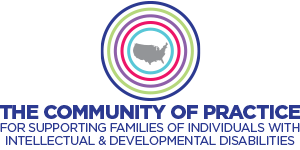Maine
Vision for Supporting Families and the CoP in ME:
OADS’ vision is to promote individual dignity through respect, choice and support for all adults. OADS is using the Charting the LifeCourse (CtLC) Framework to enhance Maine’s Person Centered Planning (PCP) process. Since the development of the previous PCP, we have heard self-advocates and families’ desire for self-determination and change, are embedding the requirements and principles outlined in the Home and Community Based Services (HCBS) Final Rule on Settings 42CFR 441.301(c)(1), and introducing the CtLC framework to help individuals develop a vision of a “good life” and discover what it takes to live the lives they want to live.
Innovation/Focus Areas:
In addition to OADS’ continued work on HCBS compliance, over the next two years OADS has engaged partners to address key reform priorities with the goal of improving systems of support and services. Key priorities include:
- Community Membership: improving inclusion of people with disabilities in their communities of choice. This work includes furthering Maine’s Employment First initiative and rolling out Maine’s enhanced PCP process including CtLC.
- Innovation: exploring new strategies for enhanced self-direction, developing innovative housing options and access to assistive technology to promote support in non-disability specific settings, and redesigning the delivery and operation of Maine’s HCBS waivers to better ensure that people have access to the services they need when they need them.
Success Stories:
Community Membership Reform Workgroup:
In the previous year, OADS heard from stakeholders who asked for services and supports that can adapt to people’s needs as they progress through the natural stages of life and a planning process that starts with life goals rather than service needs.
Purpose: In response to these voices, and as part of the work to ensure that the delivery of HCBS waiver services is consistent with the HCBS settings rule, OADS leadership launched the Community Membership Reform Work Group. This work group is tasked with advising OADS on how services and supports need to change in order to promote greater inclusion in the community through employment, access to community resources and places, self-advocacy, person-centered thinking, supported decision-making, and implementation of the HCBS settings rule.
Members: The Community Membership Reform Work Group includes self-advocates, families, guardians, providers, advocates and OADS staff members.
Timeframe: Work began in 2020 and will continue into 2021. The Biennial Plan for Adults with Intellectual/Developmental Disabilities can be viewed here.
Areas of Focus: This work group will develop recommendations on how to expand choices for individuals and their families and move toward a system designed around individual needs and has four areas of focus listed below.
- Community Support: Develop recommendations for education, training, and technical assistance to ensure that community membership is a central tenet of all services. Resources will be targeted toward multiple audiences, including individuals receiving services, families, providers, communities, case managers and others.
- Employment First: Recommend tools and strategies for expanding access to employment and self-employment and ensuring that the Employment First Maine statute is effectively implemented for individuals with an intellectual disability or autism. Quarterly Employment meetings are held for Adult DS Case Managers. OADS and VR participated in Making Employment Work for ME – 2023 Training Series from January 2023 to June 2023.
- Person-Centered Planning, Self-Advocacy, Family Support, and Engagement: Develop recommendations for education and training to ensure that individuals and family members are driving the person-centered planning process, that the planning process is focused on the individual’s changing life goals, community membership and building relationships. In-depth training has been provided to Case Managers and Waiver service providers over the past 4 months. Collaboration with the Self Advocacy group, SUFU is ongoing.
- Ongoing Compliance with HCBS Settings Rule: Recommend strategies on how OADS can monitor compliance with the HCBS settings rule on an ongoing basis and sustain implementation of the reforms. Recommendations will focus on the need for education, training, and mentorship for providers, as well as educational strategies for individuals and family members.
Resources and Highlights:
Supporting Links:
- Team/State DD Agency: https://www.maine.gov/dhhs/oads/providers/adults-with-intellectual-disability-and-autism
- Team/State DD Council Link: https://www.maineddc.org/
- Speaking for Us (SUFU): http://sufumaine.org/

Maine CoP Lead Partners:
Maine CoP for Supporting Families Facilitator(s):
Elizabeth Hopkins
Facilitator
Developmental Disabilities Services
Elizabeth.Hopkins@maine.gov
Angela Faulkner
Facilitator
Developmental Disabilities Services
angela.m.faulkner@maine.gov

